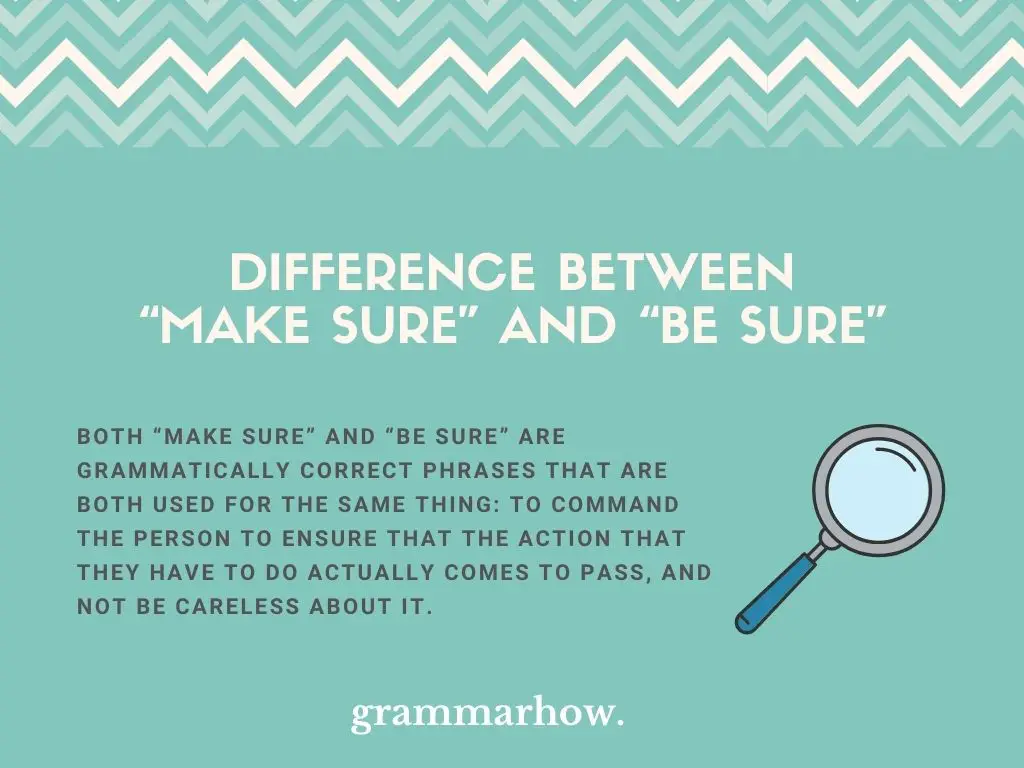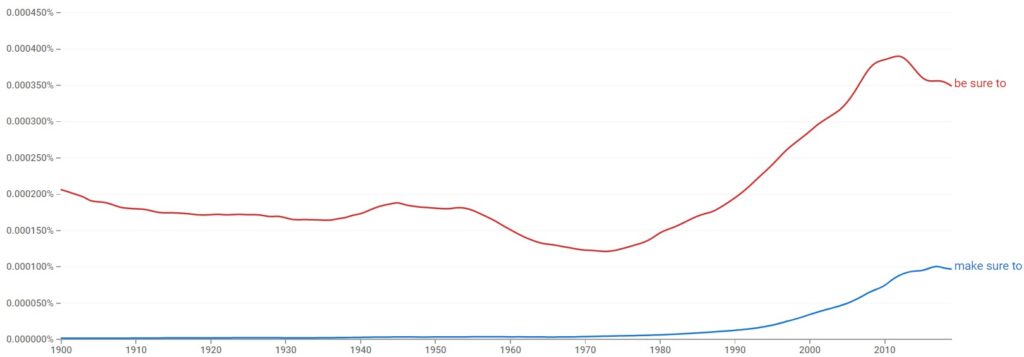Though they seem like very similar expressions, there are certain differences between the expressions “Make sure” and “Be sure”. But how vast are these differences? Is one of the forms grammatically correct? Or are they both correct? This article will exemplify the differences and clear up any doubts you have.
What Is The Difference Between “Make Sure” And “Be Sure”?
Both “Make sure” and “Be sure” are grammatically correct phrases that are both used for the same thing: To command the person to ensure that the action that they have to do actually comes to pass, and not be careless about it.

It’s easy to look at similar sentences that seem to convey the same thing and assume that one of them must be correct and one incorrect, but the truth is that both “Make sure” and “Be sure” are grammatically correct.
Whichever one people use will depend on the level of formality that the conversation entails and whatever the speaker’s preference is.
What Does “Make Sure” Mean?
“Make sure” is an expression that a person can use to emphatically ask another person to do a specific action. “Make sure” can serve as a reminder to that person that they need to do the specific action, and that it’s important.
You use “Make sure” by adding “Make sure to” in front of an imperative sentence. For example, to use “Make sure” with the phrase “Clean the dishes”, you’d say “Make sure to clean the dishes”.
Here are a few examples of the proper way you can use “Make sure” to emphasize a request:
- Please make sure to double check all of your calculations before inputting them into the system.
- Make sure to clean every nook and cranny of your room, so that dust doesn’t accumulate.
- You have to make sure to send in the email before their office closes at 5 p.m.
- Make sure that all of your necessary clothes are packed and ready for your trip tomorrow.
- Please make sure that all of your luggage is properly stored in the proper place.
- Did you make sure to forward the payment to the moving company yesterday?
- You have got to make sure that you have enough money for the return trip, too.
- She is going to make sure that he works for all of the damages he caused.
- I am going to make sure that she has the time of her life living here.
- You ought to make sure that your files are still uploading after all this time.
What Does “Be Sure” Mean?
Here’s how to use “Be sure” in a sentence: You can add “Be sure” to the beginning of a sentence that talks about a command or a request, in order to emphasize the importance of said request, and ask the person to do said action.
If you have a regular imperative sentence, you can add “Be sure to” at the beginning to emphasize the importance of the action that the person must take, and lend more weight to its execution.
These are a few example sentences that should properly show you how to use “Be sure” in a sentence:
- Be sure to forward me any similar emails that you receive throughout the month, no matter what.
- Be sure to contact her if anything goes wrong during the trip, it’s extremely important to be careful.
- Be sure to give the entire house a good clean before you leave, so it’s cleaner when you return.
- Be sure to properly check the dates and showing times before you log them in the database.
- Be sure to verify the client’s documents and ID before you continue the payment process.
- Be sure that all of your ingredients for the cake are perfectly measured and not out of date.
- Be sure to make your bed with a lot of care every morning before you leave for school.
- Be sure that your client is fully prepared for all the questions the defense might ask.
- Be sure to extend your sympathies to the family of the deceased if you see them.
- Be sure to go out and buy some bread before it’s too late to do so.
Are “Make Sure” And “Be Sure” Interchangeable?
“Make sure” and “Be sure” are interchangeable, as they are both grammatically correct and are used in the exact same way. In casual conversation, you may utilize whichever version you prefer.
The only context in which you should really take care and carefully choose what version you’re going to use is if you have to use formal language, like a business email.
“Be sure” is generally considered to be more formal than “Make sure”, so in a formal context you should use the former, and not the latter.
Is It “Make Sure To” Or “Be Sure To”?
According to information compiled by the Google Ngram Viewer, since the year 1900 “Be sure to” has gotten an immense amount of use, especially when compared to “Make sure to”. Therefore, it’s smart to use “Be sure to” rather than “Make sure to”, though both are grammatically correct, nonetheless.

Here’s an example for each construction so you get a feel for how they’re used:
- Be sure to emphasize how important you think that this job opportunity is for you.
- Make sure to clean out the fish tank and ensure that there’s no mold growing in it.
Is It “Wanted To Make Sure” Or “Wanted To Be Sure”?
According to data sourced and referenced by the Google Ngram Viewer, “Wanted to make sure” has been significantly more popular than “Wanted to be sure” ever since the year 17975. Though both expressions are grammatically correct, “Wanted to make sure” flows better and is less awkward than “Wanted to be sure”.

Here’s an example for both of the alternatives that you can use:
- I just wanted to make sure that you’re well aware of all the risk this job entails.
- She wanted to be sure that you knew how much you mean to her after all these years.
“Make Sure” And “Be Sure” – Synonyms
Here are some equivalent phrases you can use in place of “Make sure” and “Be sure”:
- Ensure
- Assure
- Verify
- Guarantee
- Double-check
You may also like: “I’ll Be Sure To Do” vs. “I’ll For Sure Do”

Martin holds a Master’s degree in Finance and International Business. He has six years of experience in professional communication with clients, executives, and colleagues. Furthermore, he has teaching experience from Aarhus University. Martin has been featured as an expert in communication and teaching on Forbes and Shopify. Read more about Martin here.
